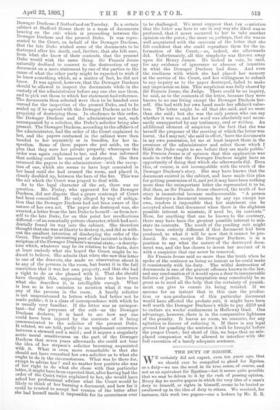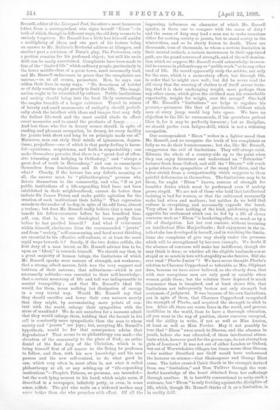THE DUTY OF EGOISM.
WE certainly did not expect, even ten years ago, that we should ever be compelled to plead for Egoism as a duty—we use the word in its true sense, of course, and not as an equivalent for Egotism—but it seems quite possible that we may be driven to it by the rush of passing opinion. Every day we receive papers in which the very idea of a inau's duty to himself, or rights in himself, seems to be buried or swallowed up in the idea of duty to others. We received, for instance, this week two papers—one a lecture by Mr. E. B.
Russell, editor of the Liverpool Post, the other a most humorous letter, from a correspondent who signs herself "E Icon "—in both of which, though in different ways, the old duty seems to be entirely forgotten. Mr. Russell has a little lost himself amidst a multiplicity of ideas, and one part of his lecture being an answer to Mr. Balfour's Rectorial address at Glasgow, and another part a criticism of Ibsen's play, The Pretender; only a portion remains for his professed object; but still his main drift can be easily ascertained. Complaints have been made to him of the "limited life" which ordinary people, particularly in the lower middle-class of a great town, must necessarily lead, and Mr. Russell endeavours to prove that the complaints are untrue,—or, at all events, premature. Men, he says, can widen their lives in many ways. "No dreariness of habitat or of daily routine ought greatly to limit the life. The imagi- nation ought to be stimulated by culture. Public institutions and society should bring into the least likely surroundings the ampler breadth of a larger existence. Travel in scenes of beauty and amid monuments of antiquity should periodi- cally stock the intellect with ideas and images that may defy the dullest life-work and the most sordid abode to efface sweet memories and to annul the products of fancy And lest those who live in dreary scenes should, in spite of reading and pleasant occupation, be dreary, let every facility for jaunts both short and long be on principle made use of." Moreover, men can strip their minds of ignorances, dogma- tiams, prejudices—one of which is that party-feeling is harm- ful—cynicisms, scepticisras, and faith in respectability ; can make themselves perceive that there is a "great deal of offen- sive trimming and hedging in Orthodoxy," and "always a great deal of truth in Heterodoxy," and can so emancipate themselves from limitations and fit themselves to be,— what P Clearly, if the lecture has any definite meaning at all, the answer must be "philanthropists," persons who devote themselves to the community, and who, if as yet public institutions of a life-expanding kind have not been established in their neighbourhood, cannot do better than imitate Sir James Picton and make public agitation for the creation of such institution their hobby." That expression sounds to the reader of to-day, in spite of its odd form, almost a truism ; but does Mr. Russell really believe that a man can benefit his fellow-creatures before he has benefited him- self, can, that is, to use theological terms, purify them before he has purified himself ? And what if retirement within himself, abstinence from the recommended " jaunts " and from society," self-communing, and hard secret thinking are essential to his effective self-culture, or at least the most rapid ways towards it P Surely, if the two duties collide, the first duty of a man intent, as Mr. Russell advises him to be, upon an "Ideal," is towards himself. We should say that, in a great majority of human beings, the limitations of which Mr. Russell speaks were sources of strength, not weakness ; that a strong, albeit narrow, faith was the very support and buttress of their natures; that solitariness—which is not necessarily solitude—was essential to their self-knowledge ; that a certain monotony of life and toil was indispensable to mental tranquillity ; and that Mr. Russell's ideal life would, for them, mean nothing but dissipation of energy in a very trivial way. Would Mr. Russell say that they should sacrifice and lower their own natures merely that they might, by accumulating more points of con- tact with the world, enlarge their sympathies with the mass of mankind P We do not ourselves for a moment admit that they would enlarge them, holding that the hermit in his cell is constantly more sympathetic than the man to whom society and " jaunts " are joys ; but, accepting Mr. Russell's hypothesis, would he for that consequence advise that degradation That seems to us philanthropy run mad,—the elevation of the community to the place of God ; an entire denial of the first duty of the Christian, which is to bring himself first of all nearer to the Being he professes to follow, and then, with his new knowledge and his new powers and his new self-control, to do what good he can, which very often is, most often is, not what is called philanthropy at all, or any setting-up of "life-expanding institutions "—People's Palaces, we presume, are intended— but the work lying nearest to his hand, which might seem, if described in a newspaper, infinitely petty, or even, in some sense, selfish. The girl who waits on a widowed mother may serve better than she who preaches with effect. Of all the improving influences on character of which Mr. Russell speaks, is there one to compare with the sense of duty ? and the sense of duty may lead a man not to make occasions either for seeking society or jaunts, but to stand sentry in the winter-time, and so be slowly frozen to death. There are thousands, tens of thousands, to whom a certain limitation in their mental outlook, a certain narrowness in their appointed path, are the grand sources of strength, and of the self-domina- tion which we suppose Mr. Russell would acknowledge is essen- tial to success in philanthropy or " public work," as in any other road of life, He would apparently strip the athlete, not only for the race, which is a momentary effort, but through life, in order that he might race well; but did he never read the old story that the wearing of clothes is of itself severe train- ing, that it is their unchanging weight, more perhaps than any other cause, which gives the civilised man his remarkable superiority, weight for weight, over the savage One-half of Mr. Russell's "limitations" are helps to regulate his powers,—pressures like that of gravitation, without which men at every jump would leap into space. We have no objection to the life he recommends, if his querulous patient likes it, for it may be perfectly innocent ; but as discipline, we should prefer even fatigue-drill, which is not a widening occupation.
Our correspondent " Elcon " writes in a lighter mood than Mr. Russell, and we recognise the truth of her complaints as fully as we do their humorousness ; but she, like Mr. Russell, exaggerates the evil of limitations. They will always exist. Educate the whole of a country-side up to the point when they can enjoy literature and understand an "Extension" lecturer fresh from Oxford, and still the " Elcons " will reach a point where the sympathies of the many fail them, and the latter shrink from a companionship which suggests to them painful deficiencies in themselves. The limitations may be to them, for aught " Elcon " knows, sources of strength for humbler duties which must be performed even if society grows stupid. We are not of those who hold that intellectual training is bad for women, or that the cultivated necessarily make bad wives and mothers ; but neither do we hold that culture is everything, and necessarily expands the heart. Very often it does nothing of the kind, quickening only the appetite for excitement which can be fed by a life of clever converse such as " Elcon "is hankering after, as much as by a life of dissipation. Let her rest content, without becoming an intellectual Miss Marjoribanks ; find enjoyment in the in- tellect she has developed in herself, and in watching the limita- tions she complains of give way slowly under the pressure which will be strengthened by her own example. We doubt if the absence of converse will make her indifferent, though she may think it does ; or whether all the eligible husbands are so stupid or so much in love with stupidity as she fancies. Did she ever read" Phoebe Junior " ? We have never thought Phoebe's relation to Clarence Copperhead so tolerable as Mrs. Oliphant does, because we have never believed, as she clearly does, that with rare exceptions men are only good or sensible when women guide them; but the relation there depicted is much commoner than is imagined, and at least shows this, that limitations not infrequently bestow not only strength but acuteness of judgment. It was because of his own limitations, not in spite of them, that Clarence Copperhead recognised the strength of Phoebe, and acquired the strength to stick to her. After all, there are worse fates in the world, and greater inanities in the world, than to have a thorough education, all you want in the way of position, clever converse excepted, and the ability to write, if not as well as Miss Austen, at least as well as Miss Ferrier. May it not possibly be true that " Elcon" owes much to Slocum, and the absence in youth, before she was educated, of those intellectual stimu- lants which, however good for the grown-ups, do not strengthen girls of fourteen? It was not out of either London or Oxford, but out of Warwickshire villages ten times worse than Slocum —for neither Stratford nor Gruff would have understood the lecturer on science—that Shakespeare and George Eliot came. The latter created Caleb Garth in the strength derived from one "limitation," and Tom Talliver through the won- derful knowledge of the heart obtained from her sufferings through another. It is horribly conventional to write such a sentence, but" Elcon "is only fretting against the discipline of life, which, though Mr. Russell thinks of it as a limitation, is in reality drill.







































 Previous page
Previous page